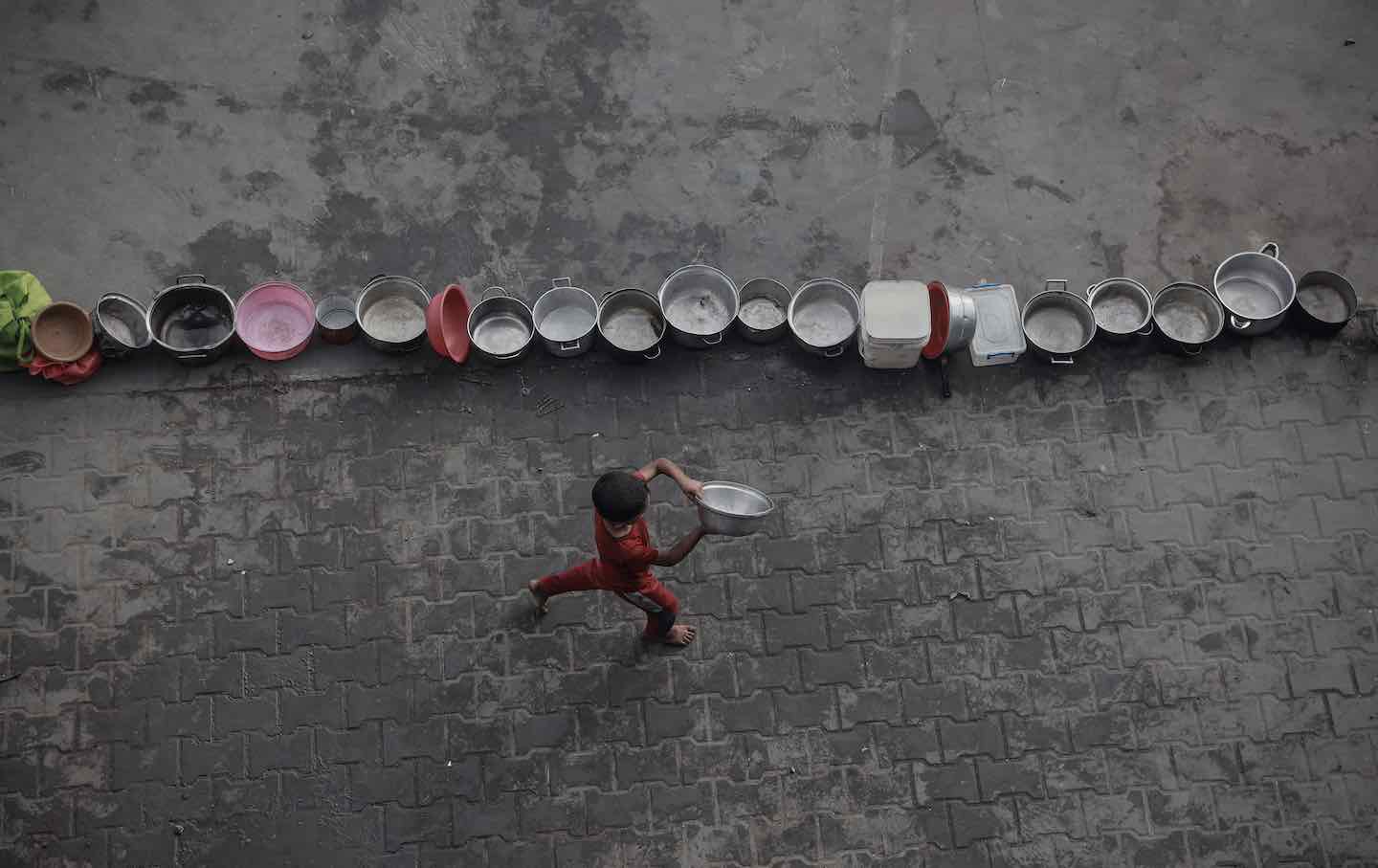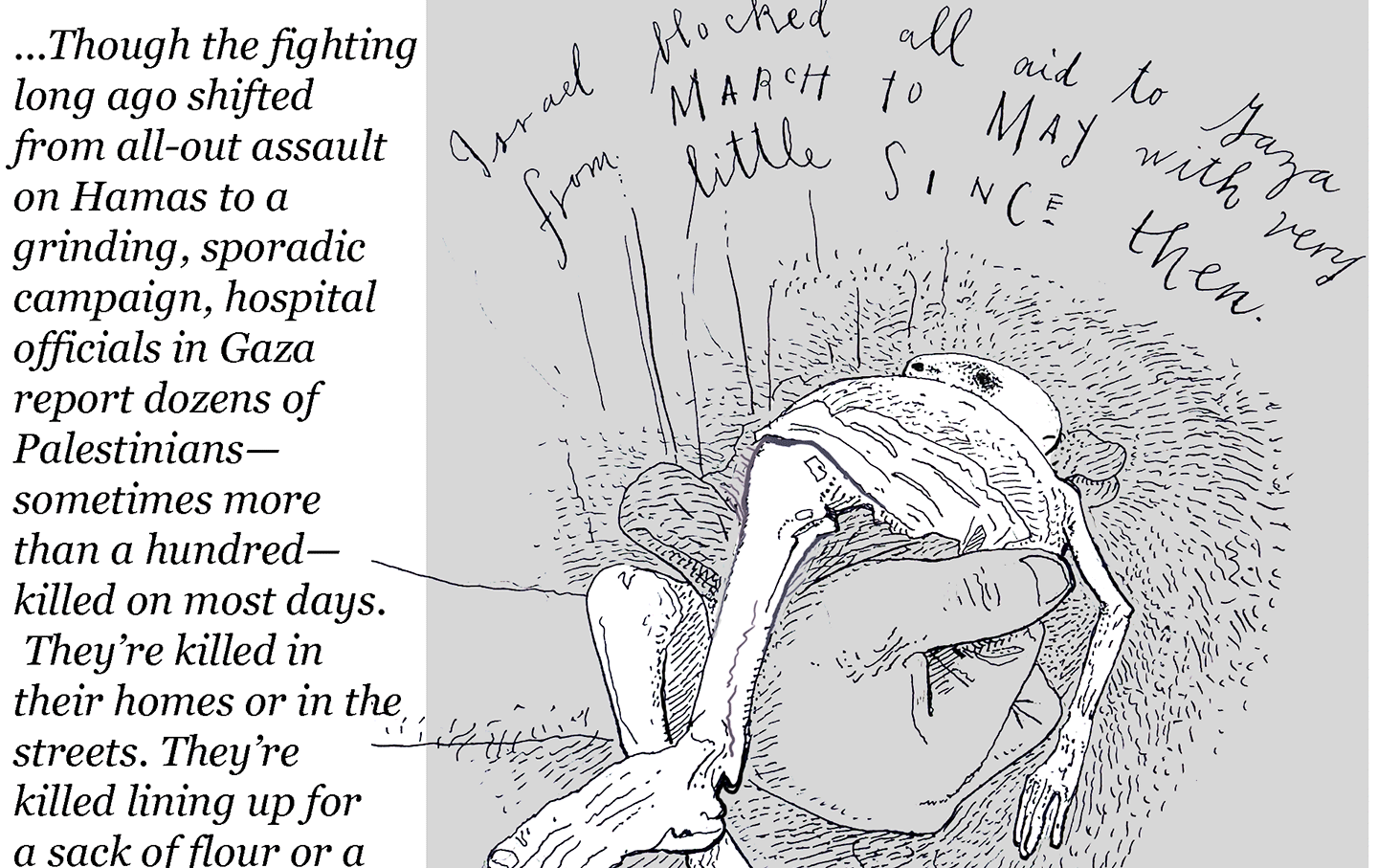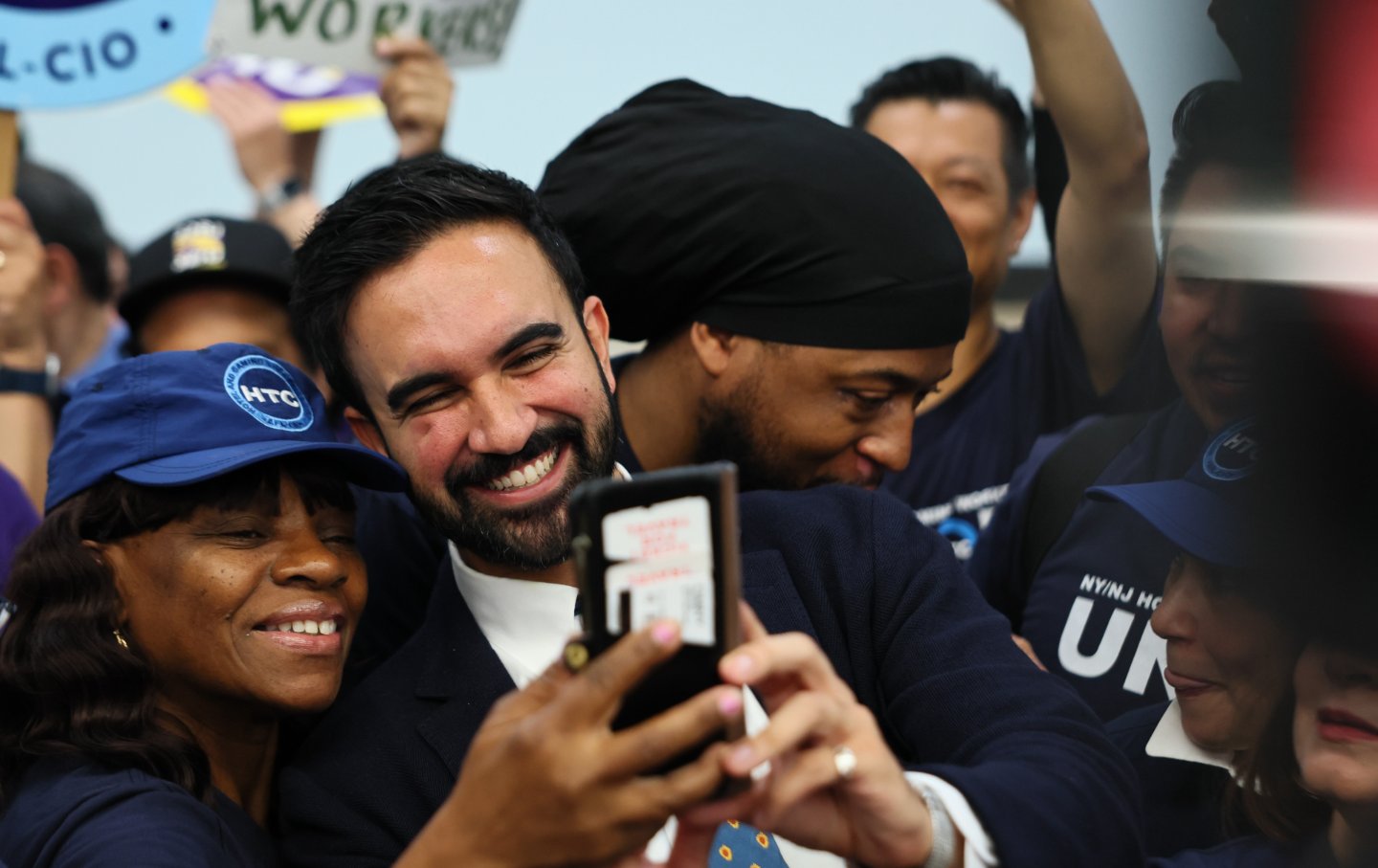Politics
/
Hiding in Plain Sight
/
August 1, 2025
I learned from a young age that you shouldn’t let your neighbor go hungry. Benjamin Netanyahu would do well to revisit this tradition.

Palestinians, struggling with hunger, form a line to receive hot meals in Gaza’s al-Zeitoun neighborhood on July 31, 2025.
(Abdalhkem Abu Riash / Anadolu via Getty Images)
For much of the past 21 months, I have sparred with friends and colleagues who labeled Israel’s response to the October 7 attack as “genocidal.” I have written, at The Nation and elsewhere, about my concerns with some of the analysis on the left. In my inner monologue as much as in conversation with others, I have argued that while what Israel was doing militarily was brutal, and that while in many instances it was committing crimes against humanity, ultimately it wasn’t a genocide.
Over the past weeks, however, as images of mass starvation have emerged out of Gaza, as hundreds of desperate Gazans have been mown down at food distribution centers—always accompanied by a cacophony of disingenuous disclaimers from the far-right thugs running the Israeli government—it has become ever harder to reach any other conclusion but that Israel’s leaders have embraced a policy of total annihilation. Having destroyed the physical infrastructure of Gaza, Benjamin Netanyahu and his government seem now intent on making life entirely untenable for the remaining residents. At this point, it would be reckless to believe otherwise.
If, in fact, Israel had any sort of exit strategy or plan for permanently ending its war on Gaza, it would need to acknowledge the humanity of its opponents and recognize their need to survive. At a most basic level, it would need to see the world from their perspective, with all that that acknowledgement entails. For empathy involves, in such circumstances, understanding that even those we fight in war love their children as we love ours, that they mourn as we mourn, that they suffer as we suffer, that their stomachs growl when hungry just as ours do.
Instead, nearly two years after Hamas’s vile attacks of October 7, Israeli public opinion, manipulated by Netanyahu and his entirely unscrupulous cabinet, seems ever-less capable of making those imaginative leaps. True, a majority of Jewish Israelis distrust Netanyahu and think he should be doing more to bring home the hostages. But that doesn’t translate to a desire to find a genuine path to long-term peace with their neighbors. Indeed, a Pew Research Center poll from earlier this year found that only 16 percent of adult Jews in Israel believe peaceful coexistence with a Palestinian state to be possible. A more recent poll found that more than four in five Jewish Israelis supported the forcible expulsion of Palestinians from Gaza, and upwards of half favored Palestinian expulsion from Israel.
That goes a long way to explaining why there haven’t been massive protests or acts of civil resistance in Israel as its leaders have, in the past couple of months, embraced the abominable strategy of wholesale starvation and the herding of Palestinians into ever smaller, more vulnerable enclaves within the decimated Gaza Strip. It’s why most Israelis have stayed silent in the face of Defense Minister Israel Katz floating the idea of forcing Gaza’s 2 million residents into an Orwellian-named “humanitarian city” atop the ruins of Rafah. And it’s why, when Israel’s ex–prime minister Ehud Olmert warned that such a city would be a “concentration camp,” the assertion didn’t serve to force a day of moral reckoning inside Israel—a country founded, after all, in the wake of the industrial slaughter, inside death camps, of Europe’s Jews. It’s why there weren’t massive protests after Heritage Minister Amichay Eliyahu publicly stated that the government’s intent is to “wipe out” Gaza and replace the population with Jewish settlers. And it’s why, over the past six months, Israelis have been broadly supportive of Trump’s criminal idea to expel all Palestinians from Gaza and create instead a “Riviera” resort for wealthy Western and Gulf-state tourists.
Sure, a growing number of scholars and Israeli human rights groups are warning that Israel is committing a genocide in Gaza. But to date their assertions have been broadly brushed aside by an Israeli public so traumatized by the horrors of October 7 that it seems willing to give its leaders carte blanche to pursue their forever war with Hamas by any means necessary, no matter the scale of the “collateral damage.”
That silence is becoming increasingly untenable. Especially considering Jewish history and beliefs, there is something uniquely appalling about a policy of deliberate starvation on millions of civilians. Yes, the deprivation is both dehumanizing and inhumane all on its own. But it also goes against Jewish traditions, like the mandate to feed the stranger. It is unfathomable to me that this tradition is being so egregiously breached by Israel’s leaders—and that those leaders dare to claim that those who oppose the cruelty of mass starvation are somehow shoring up an antisemitic project.
Among the many Jewish beliefs and traditions that should make this weaponization of food in Gaza unthinkable, the idea of tikkun olam is that one has a duty to repair, or to heal, the world. I witnessed this concept in practice, watching my grandparents open their house to friends, relatives, strangers—and always demonstrate their hospitality by providing their guests with plates of home-cooked food. For my grandmother Mimi, food was not just her love language; it was core to her being. If someone was hungry—or even if they weren’t—you fed them. If someone was worn down with the cares of the world, you lifted some of those worries by feeding them. If someone was looking for good company and good conversation, you provided both… and you fed them.
You fed them even if you, yourself, didn’t have much to spare.
My grandparents welcomed people into their home in north London during the dark days of the Second World War and the austere years of rationing that followed the war. Always, somehow, they found enough to go around. That basic understanding of the importance of food, not just for survival but for culture and for community, continued throughout their long lives.
When I was growing up, in the 1980s, I could bring an entire group of friends over after school, and, at short notice, my grandmother would rustle up food for us all. As I wrote in my book on my grandparents, The House of Twenty Thousand Books—a book about the people, the ideas, and the conversation that filled my grandparents’ home over more than half a century—there are literally thousands of people dotted around the globe who at one point or another stayed at my grandparents’ house or, at the very least, were fed and entertained by them.
It should go without saying that one does not heal the world by allowing children to die because you have denied them food. One does not heal the world by indiscriminately firing into crowds of desperate people trying to secure a few calories of donated food to take back to their families. One does not heal the world by the mass killing of doctors and nurses, of educators, of humanitarian workers, of journalists, of farmers, or, above all, of new mothers and their babies just starting out on their life journeys.
Israel’s attempt to wipe out Gaza isn’t war; at this point it is collective punishment on a truly hideous scale. It is as violative of collective moral norms as any of the other myriad great atrocities of the past century. And, while Netanyahu and his colleagues promote this murder spree as being necessary for the defense of world Jewry, in reality it is a simply grotesque inversion of Jewish traditions of hospitality, of generosity, of empathy, and of the moral imperative that one doesn’t let one’s neighbor, one’s fellow human being, go hungry.
More from The Nation


In a series of mid-decade redistricting gambits, state legislatures are looking to rig next year’s congressional balloting in advance.
David Daley

If the planet is to survive, the future needs to be green. China seems to get that—but the US is blowing it.
Jeet Heer

Or, to put it another way: Stop helping Republicans and back people like Zohran Mamdani. Now!
Justin Brannan

Donald Trump said this week that a known Epstein victim was one of the people “stolen” from Mar-a-Lago by the convicted sex offender. Could Trump have known what would happen to h…
Joan Walsh
